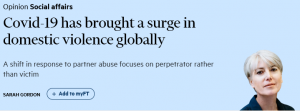Many journalists, domestic violence charities and police forces globally have reported increased levels of domestic abuse during COVID. This includes reporting increased calls to domestic abuse helplines, in one city in Hubei, the centre of the pandemic in China, reports of domestic violence have doubled, according to a local news website. MPs in the UK found that the first three weeks of lockdown saw the highest number of killings of women of any 21-day period in the past decade.
One consequence of these findings is the focus on academic research that is looking at the effectiveness of intervention with high harm, high risk and serial perpetrators and evaluation. The article below highlights Drive and their partnership between Respect, SafeLives, and Social Finance. This programme has been piloted in three areas in England and Wales from 2016 and involves intensive case management, working closely with victim services, the police, probation, children’s social services and housing, substance misuse and mental health teams. Some journalists are also focusing on the importance of offering services and responding to perpetrators not just victims.
You can access the DRIVE evaluation here.


